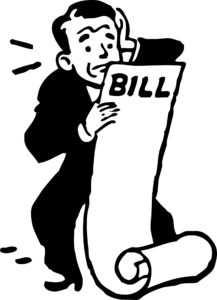
Chapter 7 Bankruptcy in Lawrence, Massachusetts
Do you live in Lawrence Massachusetts? Or, do you live within the Merrimack Valley region or the north shore? You may be eligible to file bankruptcy in Chapter 7. If you are facing a mountain of unsecured debt, bankruptcy may be the solution.
The Bankruptcy Court in Massachusetts views people seeking to file bankruptcy under Chapter 7 as presumptively able to do so if that persons income is below the median income (after expenses deducted) for the average person. Be aware, however, that you may not be able to file for bankruptcy under Chapter 7 in Massachusetts even if your median income falls below the current median income in Massachusetts if your income is sufficient to fund a Chapter 13 repayment plan. Our attorney is well versed in the differences between Chapter 7 and Chapter 13 bankruptcy and can assist you in determining which bankruptcy Chapter you best quality for.
Also, keep in mind there are circumstances when filing for Chapter 7 Bankruptcy may be a bad idea. Read Attorney Gaudet’s article on this subject here.
What Kind of Debt is Wiped Out in Chapter 7 Bankruptcy in Massachusetts?
When talking about unsecured debt that might be wiped out by filing Chapter 7 Bankruptcy in Massachusetts we are referring to money that has been used to purchase goods or services that is not bound up in physical property. For example, your car and your home are secured debt (if you still owe money on them). A car or home is secured debt because the creditor (the person or institution that gave you the money to buy the car or home) has what is known as a security interest in your car or home. In this example, if your home was mortgaged by a bank, that bank has the right to foreclose and receive either the home or the proceeds from the sale of the home if you do not pay the mortgage. In this way, the bank has a security interest in your home. In contrast, unsecured debt is debt in things like credit cards and medical bills. Generally, when filing for Chapter 7 Bankruptcy in Massachusetts you may be able to have these unsecured debts in credit cards, medical bills, and potentially other types of unsecured debt completely wiped out…forgiven.
While we haven’t discussed it yet. Part of the reason that Chapter 7 bankruptcy is termed “liquidation” bankruptcy is that the bankruptcy trustee (an official at the Bankruptcy Court in Massachusetts in either Boston or Worcester) will sell off assets that you own to pay off the people that you owe money to with the money gained from the sale of those assets. Still, certain assets cannot be touched by the bankruptcy trustee when he or she attempts to sell them off. For example, your primary home after several calculations are made and the homestead exemption is factored in may be yours to keep if your mortgage payments are current and your equity in the home is not high, and you have a homestead exemption filed in Massachusetts.
For further reading on this subject, read attorney Gaudet’s article on “How is Debt Handled in Bankruptcy in Massachusetts?“
What Happens to My Car, Boat, or Other Items When Filing Chapter 7 in Massachusetts?
In the category of non-exempt assets, under Chapter 7 bankruptcy, certain assets will be sold off by the bankruptcy trustee…these are the nonexempt assets. While it is impossible to know precisely, typically, the nonexempt assets (those you won’t be able to keep) include a second home, a second motor vehicle (car, truck, motorcycle), any recreational vehicle, a collection of, for example, guns or other valuables, bank accounts, and investment accounts (except for certain retirement accounts). These items will be sold by the bankruptcy trustee to pay off your creditors in Chapter 7 bankruptcy. If you do not own any of these items, i.e., you have only one car and you use that to travel to work…that car will likely not be liquidated in Chapter 7.
So If Chapter 7 Liquidates My Assets…What Does Chapter 13 Do?
Here is the main difference between Chapter 7 and Chapter 13 bankruptcy cases in Massachusetts. Think of Chapter 7 as liquidation…literally turning, or attempting to turn everything you own into cash to repay the creditors to whom you owe money. The trade off in Chapter 7 is, that although you lose most of your property, you gain nearly complete freedom from debt. Think of Chapter 13 as a repayment plan. The goal in Chapter 13 is to treat you more like a co-partner with your creditors. You are placed in the position to repay these creditors over time based upon you ability to do so. The trade off in Chapter 13 in Massachusetts is that you will likely get to keep the majority of your assets while making these payments. At the end of the payoff period your debts will most typically be completely discharged.
You won’t always have the choice as to which bankruptcy Chapter, 7 or 13, to file in Massachusetts. The lack of choice occurs because you may make too much money to qualify for Chapter 7, or there may be other reasons. A good attorney can help you understand the ins and outs of these two options and how to proceed.
Learn More About Bankruptcy….by reading my “Frequently Asked Questions About Bankruptcy” article.
DISCLAIMER:
The information provided in the pages and posts of this website are for general informational purposes only. The information presented on this site is not legal advice, and no attorney-client relationship is formed by the use of this site.


